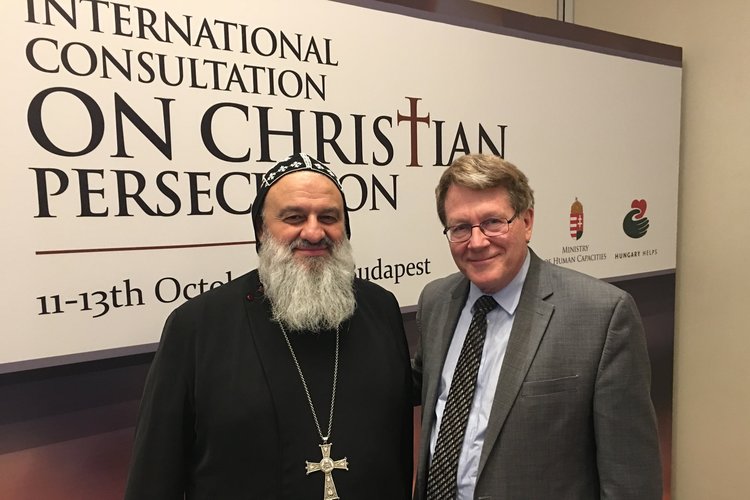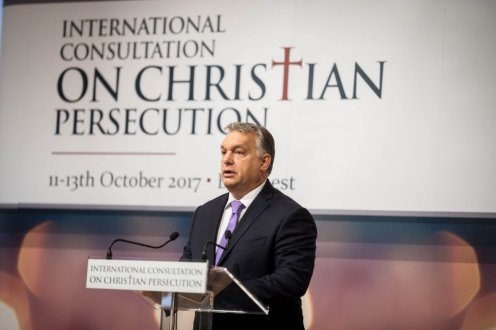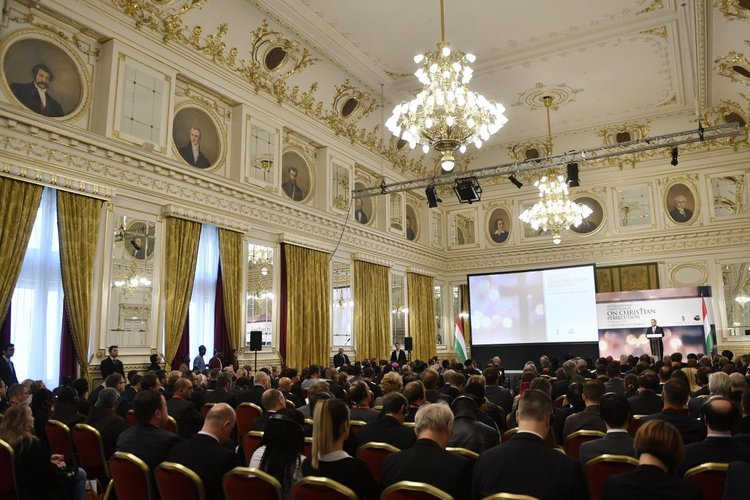
The survival of Christianity in Iraq and Syria, the lands of its birth, is also a question of the survival of pluralism and religious freedom. The specter of Islamist extremist groups such as the Islamic state, brutal repression by authoritarian leaders, and a geopolitical conflict exacerbated by Sunni and Shi’a divisions have combined to threaten the presence of entire Christian communities.
These threats were the backdrop for the International Consultation on Christian Persecution – Finding the Appropriate Answers to a Long Neglected Crisis in Budapest hosted by the Hungarian Government’s Ministry of Human Capacities and Deputy State Secretariat for the Aid of Persecuted Christians.
Kent Hill, Executive Director of the Religious Freedom Institute and Director of the Middle East Action Team, addressed the consultation in a panel discussion on the critical role of international organizations and countries to promote religious freedom and protection of religious minorities through their foreign policy and international commitments.
It is imperative that we make the ‘pragmatic’ case for religious freedom. The emperical evidence is absolutely clear that there is direct correlation between the existence of religious freedom and all sorts of other social goods. In addition, where there is an absence of religious freedom, the chances of terrorism increase greatly.
Kent Hill, Budapest, Hungary, Oct. 12, 2017
Dr. Hill was joined in the discussion by Ján Figel’, the European Union’s Special Envoy for Freedom of Religion or Belief, Ignatius Aphrem II, Patriarch of Antioch and All the East and Supreme Head of the Syriac Orthodox Church, and Director of Aid to the Church in Need France Mr. Marc Fromager.
Implementing international commitments to protect religious minorities will be sustainable only if it includes religious freedom for all in the society, including a protections not just for religious minorities, but also for the majority community.

Viktor Orbán, Hungarian Prime Minister, delivered an opening speech to the consultation, calling on others to join their efforts of enabling Christian communities to return to their homelands. As he detailed the strategy his government has taken in working directly with churches, he acknowledged a larger goal that “we want Christian communities returning to Syria, Iraq and Nigeria to become forces for the preservation of their own countries, just as for us Hungarians Christianity is a force for preservation.”
Prime Minister Orbán highlighted the provision of more than $2 million in assistance to provide for the reconstruction of homes in Teleskof, a Christian town on the Nineveh Plains. He urged other countries and international donors to follow suit, working with the Churches and their combined efforts such as the Nineveh Reconstruction Committee.

The discussion throughout the consultation focused on finding concrete action steps that will enable the sustainable return of Christian communities to their homelands and address the root causes that are driving conflict and displacement.
Hungarian Foreign Minister, Péter Szijjártó, in his remarks cited the need for international cooperation to “give a clear and coordinated answer to the extremism spreading in the world and forcing millions to leave their homes.”
Any sustained effort will require the continued provision of humanitarian assistance for the reconstruction and revitalization of these communities and must also include the work of civil society and government to address the societal and political factors that have incubated religion-related violence and terrorism.
THE RFI BLOG

Myths of Religious Nationalism in America and Abroad

France’s Olympic Hijab Ban Violates International Law And Exacerbates Tensions

RFI Briefs USCIRF on Lessons from 25 Years of U.S. Designating Religious Freedom Violators

Thought Police: Protecting the People from Prayer

A Religious “Delaware”: Establishing a State Haven for Religious Corporations
CORNERSTONE FORUM

Challenges to Religious Freedom in Iraq and the Critical Need for Action

Public Bioethics & the Failure of Expressive Individualism

Religious Liberty in American Higher Education

Scotland’s Kate Forbes and the March of Secularism

